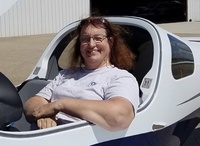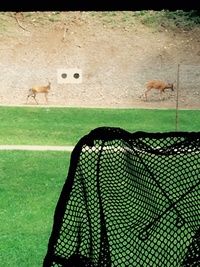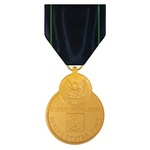How valid are these basics that I found on YouTube?
+4
Wobbley
joy2shoot
Chris Miceli
AllAces
8 posters
Page 1 of 1
 How valid are these basics that I found on YouTube?
How valid are these basics that I found on YouTube?
Pistol Shooting Techniques
Found on YouTube
Source: Ten Metre Air Pistol Shooting Basics, by Ishaan Dhillon
https://youtu.be/2UR_GMHU5L0
The air pistol basics seem to be adaptable to firearms.
You have to read subtitles when you watch these, but they go into far greater detail with live action.
Pistol Shooting Basics, by Efim Khaidurov circa 1982;
https://youtu.be/TSW1sFMCMCs
Rapid-Fire Pistol Shooting Basics, by Efim Khaidurov circa 1983.
https://youtu.be/SrVcN6Id2hA
I’d like to see the last two Russian videos re-done in English and in color.
Ten Metre Air Pistol Shooting Basics, by Ishaan Dhillon










Guest- Guest
 Re: How valid are these basics that I found on YouTube?
Re: How valid are these basics that I found on YouTube?
About ten years ago a friend translated for me a manual written by a Russian air pistol coach. The methods in the manual appear to be the same as on YouTube. The manual was a great help with 10 meter and rimfire but less so with the 1911.

AllAces- Posts : 745
Join date : 2011-08-30
 Re: How valid are these basics that I found on YouTube?
Re: How valid are these basics that I found on YouTube?
while precision shooting is similar in many traits some do not cross over to bullseye. If you have the ISSF shooter weenie(which i am becoming) stance you will be blown around by the 45. Develop your stance, your grip, your trigger finger placement. Looking at some articles Zins has written, the AMU advanced book, pistol shooters treasury.
Chris Miceli- Posts : 2715
Join date : 2015-10-27
Location : Northern Virginia
 Re: How valid are these basics that I found on YouTube?
Re: How valid are these basics that I found on YouTube?
I agree with Chris regarding stance. If your feet are only shoulder width apart, the .45 will be more of a challenge to maintain balance. However, I do agree with the diagrams statement to slightly bend away from the shooting arm to maintain a proper center of gravity even though the diagram does not show the shooter doing that.
I also like the 'Grip' diagram ... trigger pull in line with deep pocket of hand (where the gun's backstrap should be). It would have been better if they continued it to show trigger pull in line with aiming eye.
The sighting diagrams are accurate (for iron sights of course).
I think the Trigger Position diagram is good. I use the second position in the diagram.
The Breathing and Triggering diagram has some good points.
Follow Through is always interesting to me. I have heard elite shooters (High Masters who shoot in the upper echelon of their class) say follow through is a waste of time and I have heard other elite shooters say follow through is very important.
I also like the 'Grip' diagram ... trigger pull in line with deep pocket of hand (where the gun's backstrap should be). It would have been better if they continued it to show trigger pull in line with aiming eye.
The sighting diagrams are accurate (for iron sights of course).
I think the Trigger Position diagram is good. I use the second position in the diagram.
The Breathing and Triggering diagram has some good points.
Follow Through is always interesting to me. I have heard elite shooters (High Masters who shoot in the upper echelon of their class) say follow through is a waste of time and I have heard other elite shooters say follow through is very important.
joy2shoot- Posts : 570
Join date : 2014-08-02
Location : North Carolina
 Re: How valid are these basics that I found on YouTube?
Re: How valid are these basics that I found on YouTube?
joy2shoot wrote:I agree with Chris regarding stance. If your feet are only shoulder width apart, the .45 will be more of a challenge to maintain balance. However, I do agree with the diagrams statement to slightly bend away from the shooting arm to maintain a proper center of gravity even though the diagram does not show the shooter doing that.
I also like the 'Grip' diagram ... trigger pull in line with deep pocket of hand (where the gun's backstrap should be). It would have been better if they continued it to show trigger pull in line with aiming eye.
The sighting diagrams are accurate (for iron sights of course).
I think the Trigger Position diagram is good. I use the second position in the diagram.
The Breathing and Triggering diagram has some good points.
Follow Through is always interesting to me. I have heard elite shooters (High Masters who shoot in the upper echelon of their class) say follow through is a waste of time and I have heard other elite shooters say follow through is very important.
The shot breaks for me, i recall where the sight was when it broke, call the shot and arm comes down. I do not return to the target(maybe 1 second but probably less) usually..... unless before hand i know i'm going for another shot because of conditions. Some people will hold for 10+ seconds after the shot is gone....i'm unclear what that does. I should watch some standard pistol shooters during the precision stage wonder if they follow up with shots often.
Last edited by Chris Miceli on 10/10/2017, 9:37 am; edited 1 time in total
Chris Miceli- Posts : 2715
Join date : 2015-10-27
Location : Northern Virginia
 Re: How valid are these basics that I found on YouTube?
Re: How valid are these basics that I found on YouTube?
Depends on what you do as “follow through”. If you bring back the gun to the target re-acquiring the sight picture, that is an exaggerated follow through and is a waste of time and energy. The purpose of “follow through” is to train your muscles to hold the same tension until the bullet has left the barrel. In pistol shooting that time is less than 1/100th of a second. So the purpose is to train yourself to not relax as you squeeze the trigger. So that level of “follow through” is important.joy2shoot wrote:
Follow Through is always interesting to me. I have heard elite shooters (High Masters who shoot in the upper echelon of their class) say follow through is a waste of time and I have heard other elite shooters say follow through is very important.

Wobbley- Admin
- Posts : 4808
Join date : 2015-02-12
 Re: How valid are these basics that I found on YouTube?
Re: How valid are these basics that I found on YouTube?
Follow through is a time where you are initiating no new physical actions - therefore all your mental ability can be focused on recalling all the things that just happened and helping them from subconscious to conscious memory.
Where was dot/sight picture when shot broke?
Where do I call the shot?
How was my shot execution?
Anything I need to adjust in my next shot execution?
I find when I shoot sustained strings, I can remember less info about the last shot than when in SF.
My guess would be that those with long follow-throughs are not just being a statue for a physical benefit.
It would be interesting to know if anyone uses a mental checklist (like above) after the shot breaks and before they lower the pistol.
Where was dot/sight picture when shot broke?
Where do I call the shot?
How was my shot execution?
Anything I need to adjust in my next shot execution?
I find when I shoot sustained strings, I can remember less info about the last shot than when in SF.
My guess would be that those with long follow-throughs are not just being a statue for a physical benefit.
It would be interesting to know if anyone uses a mental checklist (like above) after the shot breaks and before they lower the pistol.

Aprilian- Posts : 987
Join date : 2016-05-13
Location : Minnesota
 Re: How valid are these basics that I found on YouTube?
Re: How valid are these basics that I found on YouTube?
You hit the X with your purpose of follow through statement. I found myself relaxing the grip to soon and I got to the point I was relaxing it as the shot broke. By making sure I used good follow through really improved my groups. If you hold long enough to call the shot then you are not going to relax to early like i was doing. This is a real mental game. DonWobbley wrote:Depends on what you do as “follow through”. If you bring back the gun to the target re-acquiring the sight picture, that is an exaggerated follow through and is a waste of time and energy. The purpose of “follow through” is to train your muscles to hold the same tension until the bullet has left the barrel. In pistol shooting that time is less than 1/100th of a second. So the purpose is to train yourself to not relax as you squeeze the trigger. So that level of “follow through” is important.joy2shoot wrote:
Follow Through is always interesting to me. I have heard elite shooters (High Masters who shoot in the upper echelon of their class) say follow through is a waste of time and I have heard other elite shooters say follow through is very important.

Magload- Posts : 1173
Join date : 2016-11-18
Age : 77
Location : NE Florida
 Re: How valid are these basics that I found on YouTube?
Re: How valid are these basics that I found on YouTube?
Wobbley wrote:Depends on what you do as “follow through”. If you bring back the gun to the target re-acquiring the sight picture, that is an exaggerated follow through and is a waste of time and energy. The purpose of “follow through” is to train your muscles to hold the same tension until the bullet has left the barrel. In pistol shooting that time is less than 1/100th of a second. So the purpose is to train yourself to not relax as you squeeze the trigger. So that level of “follow through” is important.joy2shoot wrote:
Follow Through is always interesting to me. I have heard elite shooters (High Masters who shoot in the upper echelon of their class) say follow through is a waste of time and I have heard other elite shooters say follow through is very important.
When you are at Perry and trying to use the wind lulls to your best advantage, having the habit of coming back to the target for a potential followup shot may be a very good thing. The faster you get 10 good shots down range the less stress you put on your body. That's not much of an issue for AMU and the Marine Team. But when you are 50+ less stress on the body may mean better performance.

jmdavis- Posts : 1409
Join date : 2012-03-23
Location : Virginia
 Re: How valid are these basics that I found on YouTube?
Re: How valid are these basics that I found on YouTube?
Mr. Zin set me straight on trigger placement. Since I wrapped my hand around the grip more so I could put the first joint crease on the trigger, it was like night and day. I could really feel the trigger movement. With my hand farther around the grip, my control of the pistol was 100% better.
Here are the direct links to the articles.
https://www.ssusa.org/
Shooting Sports USA,
The articles by BRIAN ZINS
SSUSA.ORG | JANUARY 2017 page 28
https://www.ssusa.org/articles/2017/1/31/a-clinic-on-precision-pistol-fundamentals-part-i/

SSUSA.ORG | FEBRUARY 2017 24
https://www.ssusa.org/articles/2017/2/15/a-clinic-on-precision-pistol-fundamentals-part-ii/
Here are the direct links to the articles.
https://www.ssusa.org/
Shooting Sports USA,
The articles by BRIAN ZINS
SSUSA.ORG | JANUARY 2017 page 28
https://www.ssusa.org/articles/2017/1/31/a-clinic-on-precision-pistol-fundamentals-part-i/
SSUSA.ORG | FEBRUARY 2017 24
https://www.ssusa.org/articles/2017/2/15/a-clinic-on-precision-pistol-fundamentals-part-ii/
Guest- Guest
 Basic fundamentals
Basic fundamentals
The air pistol video had nice music, very relaxing. It all seemed correct to me. I never appreciate when they show you how not to do something though, (the sight picture examples). The clear front sight method is used because the eye cannot focus in two places at once. I believe some people could hold hard enough to remember an image (target) while switching their focus to the front sight, but nobody has grown an eye yet that can focus in two places. The crook of the trigger finger is something I learned a long time ago, but you still have to physically move the tip of the finger.

Keithcrc- Posts : 43
Join date : 2017-08-18
 Similar topics
Similar topics» Checking if a concept I read about here several years ago is still valid.
» Reloading Basics
» Getting off a plateau
» 32 S&W Long basics
» Back to the Basics
» Reloading Basics
» Getting off a plateau
» 32 S&W Long basics
» Back to the Basics
Page 1 of 1
Permissions in this forum:
You cannot reply to topics in this forum